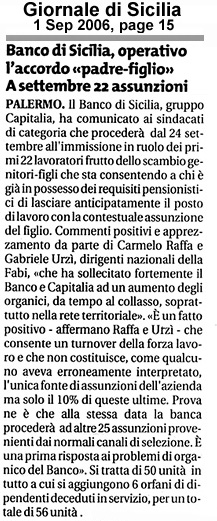...Best of Sicily presents... Best of Sicily Magazine. ... Dedicated to Sicilian art, culture, history, people, places and all things Sicilian. |
by Maria Luisa Romano | ||
Magazine Index Best of Sicily Arts & Culture Fashion Food & Wine History & Society About Us Travel Faqs Contact Map of Sicily
|
"this week news emerged of a university rector who, the day before he retired on October 31st, signed a decree to make his son a lecturer... At Palermo University, as many as 230 teachers are reported to be related to other teachers." Speaking of the national trend in this direction, the article went on to state that: "The creation of jobs for relatives and friends has helped to inflate
the number of Italian academics... 13,000 junior posts have been advertised
in the past seven years, yet 26,000 have been filled... Not one Italian
institution is in the top 100 of the 2008 Times Higher Education world university
rankings." Unfortunately, this is all true, and while nepotism is not, strictly speaking, illegal in Italy, the means of getting a job for a relative often are. Typically, a university teaching position is given to a professor's child, spouse or lover (sexual liaisons being common between ageing male professors and aspiring young female associates) without the position having been announced officially, or perhaps the opening has been made public only in an obscure posting on a bulletin board in an office to which the general public has limited access. This corrupt practice of informing "favourite" candidates of available positions while concealing the same information from worthy candidates in the general population explains how twice as many junior posts could be filled as were actually advertised. The universities have no monopoly on such practices. In some cases they are actually institutionalised. Until its recent acquisition by Unicredit, a large Milanese bank, the Banco di Sicilia promoted a program for retiring employees to leave their positions to their children, as though these offspring were heirs to a family business (the phenomenon is described in the newspaper clipping shown here). It is even possible for the retiring employee of a large hotel to negotiate a position for his son or daughter, perhaps based on the retiree accepting a slightly lesser pension in exchange for his child getting a job. Then there's cronyism based on political affiliations or other factors. Here's a typical example. Recently, a 12-month work project for young people (in Sicily you're considered "young" and are probably underemployed until at least the age of 30) began to accept applications for around a hundred positions which pay about 500 euros per month --hardly a princely sum but the positions entail little actual work. Some qualified people applied but noticed that the job interviews were rather superficial, built around questions such as, "Why would you like this job?" It turns out that the only applicants to receive these (admittedly mediocre) positions were those affiliated in some way with the dominant political party. Even those who were "recommended" (based on preferments) did not get jobs unless they were known party supporters or the children of party activists. In this ridiculous milieu it's easy to understand why many young, well-educated people leave Sicily, and according to the Economist article, Italy's dropout rate of 55% is the highest in the rich world. (Student life at Palermo's university is terrible.) Sadly, there's little indication that much will change in the near future, but the fact that the press is writing about the phenomenon of nepotism is a good sign. Those promoting such practices can run but they can no longer hide. A recent issue of the Palermo edition of the daily La Repubblica published several articles on the local university nepotism problem, complete with dozens of names; the entire institution is controlled by a hundred families as though it were a business run by the Mafia. There is hope that if organised crime can be defeated, or at least reined in, practices like rampant nepotism can also be brought under control. About the Author: Maria Luisa Romano has written for various Italian magazines, including this one. | |
Top of Page |
 It's always
interesting when the international
press picks up a story that those of us here in Sicily thought prompted
little curiosity beyond our own shores, but some things are so bizarre that
they're difficult to ignore. As part of an article on problems and reforms
in Italy's universities and other public schools, The Economist ("Higher
Education in Italy - A Case for Change,"15 November 2008, page 32)
recently had this to say about nepotism at the
It's always
interesting when the international
press picks up a story that those of us here in Sicily thought prompted
little curiosity beyond our own shores, but some things are so bizarre that
they're difficult to ignore. As part of an article on problems and reforms
in Italy's universities and other public schools, The Economist ("Higher
Education in Italy - A Case for Change,"15 November 2008, page 32)
recently had this to say about nepotism at the 